“I’ve had worse.”
This isn’t the first lie I’ve told myself today. I grit my teeth and tighten my grip as the rope strips away what little skin remains on my hands. Fresh blood escapes my clenched fist and makes a frantic dash towards my elbow, only to be cut short as we slam into another massive wave. The wind drives us forward with terrifying force, and one fact is becoming clearer by the second; our boat wasn’t designed for this.
Can’t be long now.
I hang from the furthest point of the left outrigger, fighting furiously to keep us right-side-up. My muscles throb with fatigue, and my forearms spasm painfully. Our boat groans as the ocean heaves her skyward and, for a brief moment, I see land. It’s tantalizingly close. More than 11 hours have passed since we set sail on this leg of the race. We are already two hours late, and daylight is fading fast.
Can’t be long now.
My strength is failing. This “adventure” has exacted a terrible toll on my body. Over the past three days, I have puked up everything that made it past my lips. I puked until I was empty, and then I puked some more. Even now, my stomach muscles contract violently as my body continues its futile attempt to eliminate any hydration that still remains. Heatstroke and seasickness have left me utterly drained. I’m running on empty. I’m spent.
Can’t be long now.
Clinton, the other half of team “Breaking Wind,” isn’t looking too good, either. He broke his wrist on our first day at sea and is in an enormous amount of pain. The boat that we’re sailing, known as an “Ngalawa,” is an 800-year-old African fishing vessel that was designed for a crew of three able-bodied sailors. The two of us are neither able-bodied, nor sailors and our 300-kilometer expedition is hardly a fishing trip. If I was capable of coherent thought, I might take a moment to appreciate the genius of this idea. For now, though, only one thought occupies my delirious mind:
Can’t be long now.
My grip falters. The fact that I haven’t already fallen into the ocean is nothing short of a miracle. I am seconds away from breaking point. Desperation claws at my insides like a drowning rat.
“Clinton!” I yell, failing to keep the panic from my voice. “How much further?!”
Clinton studies the map. His examination can’t take more than a few seconds, but it feels like an eternity. Finally, he looks up.
“Four hours!” he shouts in reply.
God help us.
Welcome to the Ngalawa Cup
That night, the strong offshore wind and giant waves left us stranded about five kilometers from the beach. Four hours became eight, and soon we were both exhausted. We checked our position on the map every 30 minutes and, despite our best efforts, found that we were being pushed almost 500 meters out to sea with every passing hour.
Eventually, in a last-ditch effort to make headway, I had to break out the paddle and assist our progress with brute force. Needless to say, by this time, I was running low on brute force. An hour later, drained beyond description, we consulted the map and found, to our absolute dismay, that we had lost yet another 500 meters.
It was around this time that we started to see the flares.
As it turns out, we weren’t the only team having a hard time. We later learned that only one team made to the shore unassisted that night. The rest of us had to be found and rescued by the loan support boat. The stormy conditions and poor visibility made it near impossible for our rescuers to locate us. Finally, we dragged our battered bodies up the beach and collapsed just before midnight.
This brought a close to day three of ten.
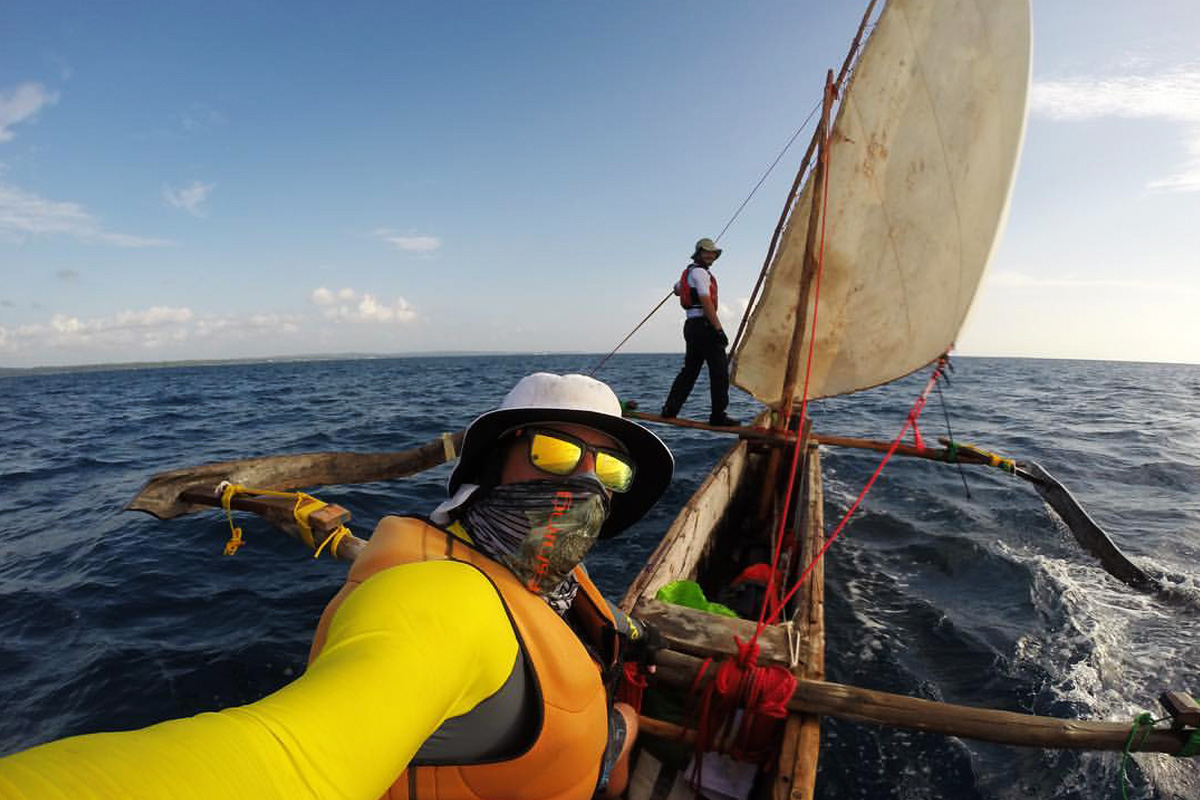
Team Breaking Wind
The Ngalawa Cup is a 300-kilometer sailing race through the islands of the Zanzibar Archipelago. The thing that makes it a truly unique experience, however, isn’t the stunning setting; it’s the boat.
An Ngalawa is, in essence, a hollowed-out mango tree with a sail. It comes with little in the way of comfort, nothing in the way of technology, and is notoriously difficult to keep upright. This became evident when Clinton and I broke the record for the quickest-ever capsize, which came less than five minutes into our first (and only) day of training.
The Ngalawa Cup is a challenge at the best of times. For me, the addition of seasickness, dehydration, and heatstroke pushed me to the edge of my endurance. Not a day went by that I didn’t think about handing in my bailing bucket and going home. After a while, even the small things, like the constant dampness, mosquito bites, sunburn, and bleeding hands and feet, became hard to bear. I remember, somewhere around the halfway mark, lying in my hammock, looking up at the stars, and fantasizing about dry underwear.
My kingdom for a dry pair of jocks!
It wasn’t all bad, though. Sure, the experience slowly extinguished my will to live, but there were good times, too. For example…
Untouched Beauty
To say that we witnessed profound natural beauty would be a monumental understatement. When we weren’t battling storms, it was like sailing through a postcard; white sand beached, crystal clear waters, teeming coral reefs, and, for the most part, no sign of humanity.
At night, we would choose a deserted island, sling a hammock between two palm trees, and stare into a trillion stars. Then, we would close our eyes and fall asleep to the unobstructed sounds of nature. I frequently found myself observing my surroundings in slack-jawed wonder while asking myself “where on earth am I?”
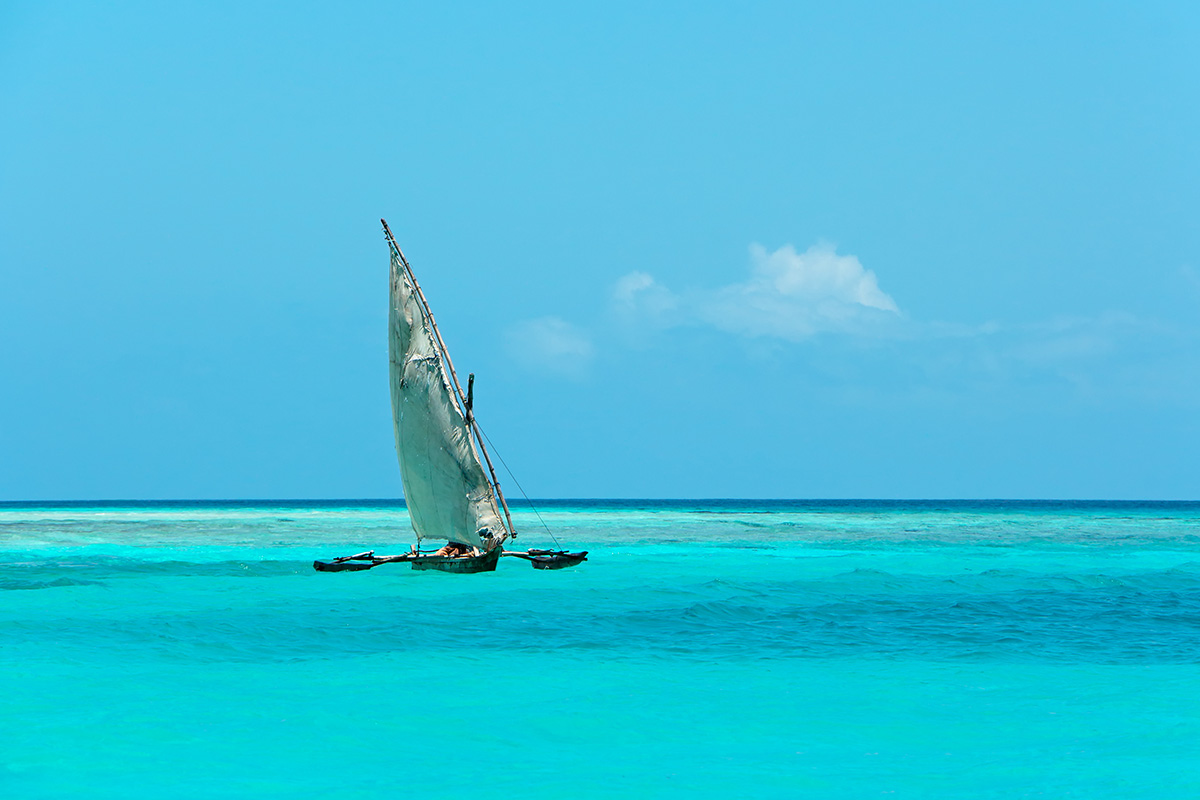
Harrowing Tails
We shared the adventure with ten other teams from around the globe. As night fell, we often found ourselves setting up camp on the same island, building a fire, and sharing harrowing tales about our struggles at sea. Some teams were there to race, others were there to have a good time, and still others, like us, just wanted to make it to the finish line in one piece. Whatever the motivation, though, we were sharing an experience that we knew would be impossible to fully explain to those who were waiting for us back home.
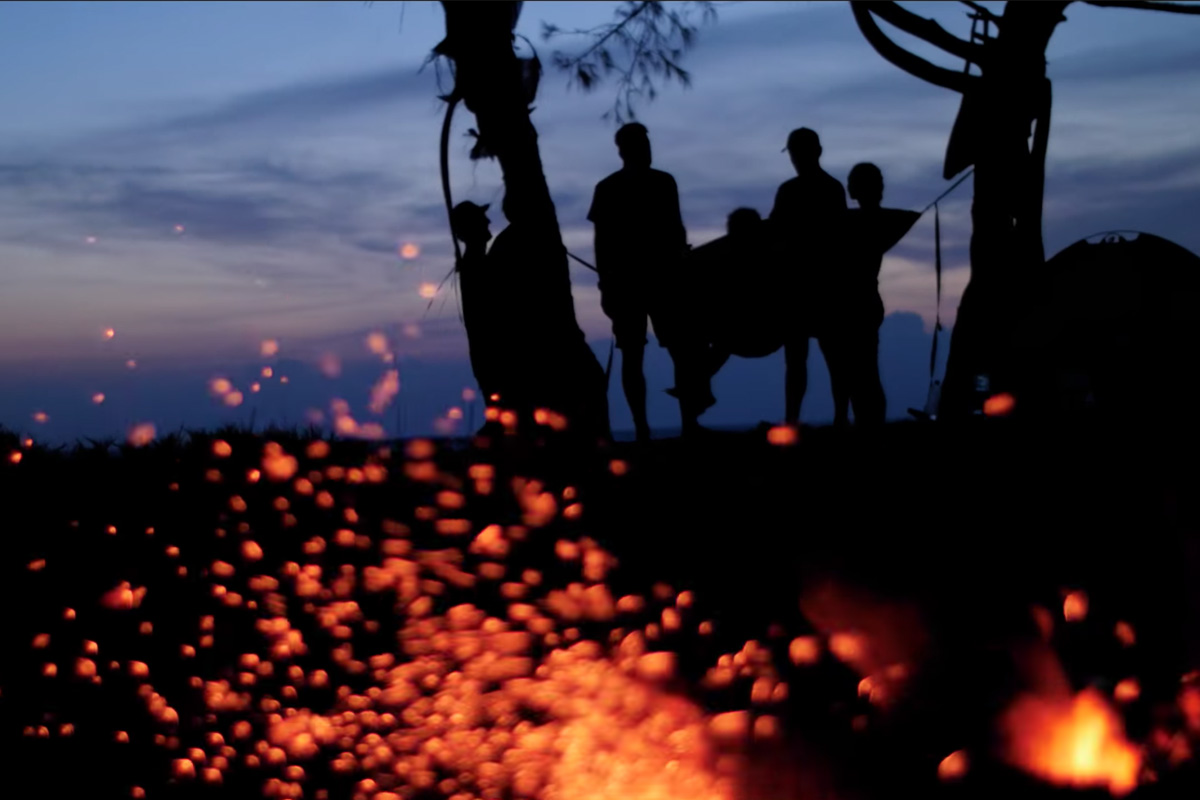
Aqua Poos
For many, the highlight of the adventure wasn’t what you might expect. The “aqua poo,” which was often likened to a water birth, quickly became the most popular fire-side topic of the trip, and many expressed concerns that they would struggle to adapt to dry-land ablutions after the race.
When we arrived in Zanzibar, most of us were aqua-poo amateurs. Fortunately, there was a handful of veterans who were able to impart key techniques and strategies that had us contributing to the local eco-system in no time.
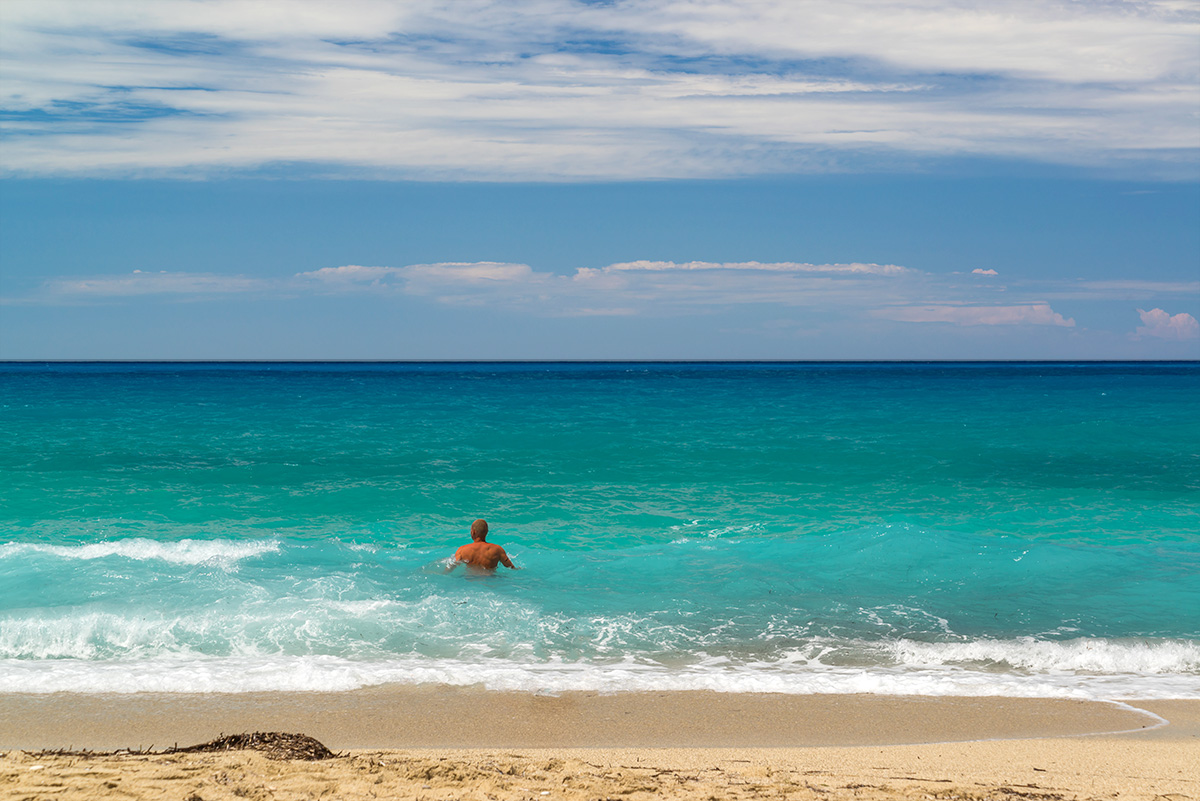
Hidden Treasure
Though the struggle was real, I wouldn’t trade it for anything. Over the course of ten days, I learned a great deal about myself that may otherwise have remained undiscovered. Most adventures don’t result in the discovery of buried treasure but, if Disney has taught us anything, it’s that the adventure itself allows us to uncover something that is far more valuable.
Andrew Murphy famously said, “You are confined only by the walls you build yourself.” My personal policy is to test my limitations rather than simply accepting them by faith.
Than Ngalawa Cup is the hardest thing that I’ve ever done, but it won’t be for long.
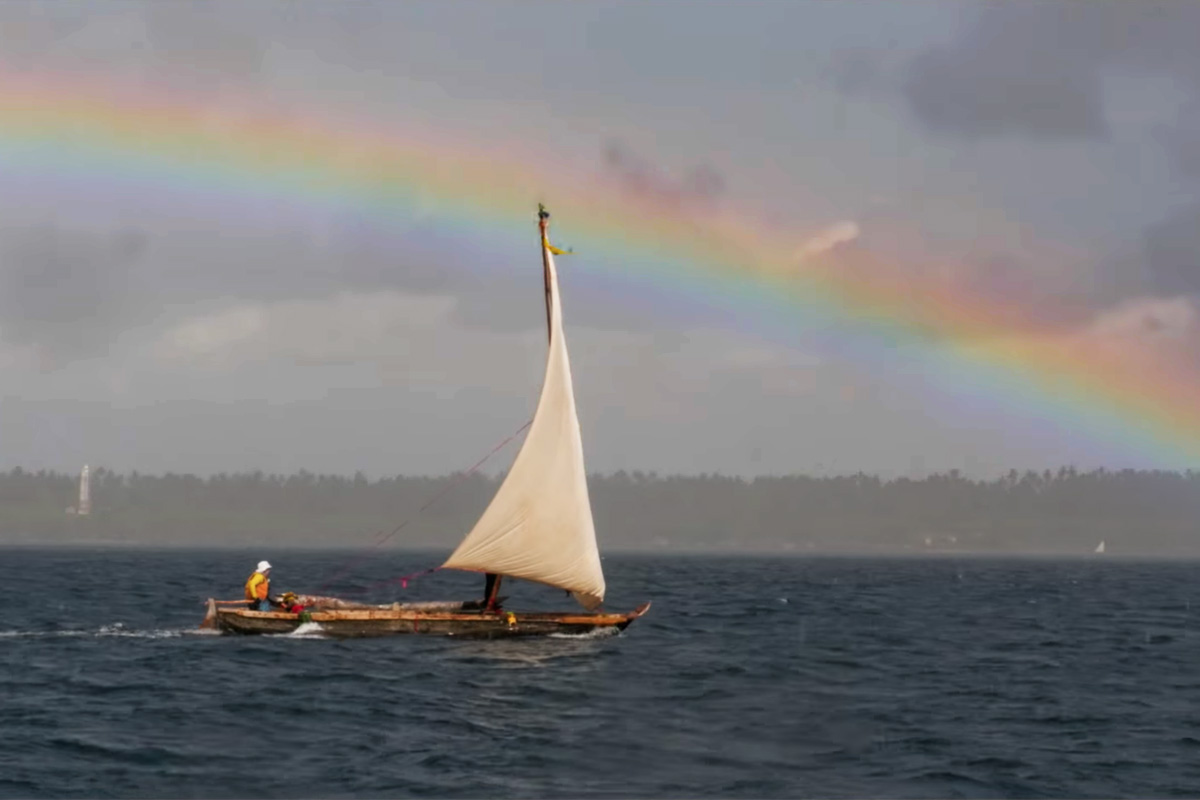
The Final Sprint
My Ngalawa Cup experience was jam-packed with adventures. Honestly, choosing which stories to include in this post has been challenging. I could tell you about the many times we capsized, most often at night, and spent hours trying to right the boat in near-total darkness. I could tell you about the time that we got hit by a monstrous wave and had to choose between our food, which was floating north, and our rudder, which was floating south. I could tell you about the times that I passed out from dehydration and heat stroke and woke up to the most fantastic hallucinations. The most hair-raising tale, however, took place as we approached the finish line.
***
“Pan-pan, pan-pan, pan-pan, Ngalawa fishing vessel in distress, request immediate assistance.” Jonty’s voice is steady despite the chaos that surrounds us.
No reply.
What the hell are we going to do? We’re in real trouble, now. This isn’t a game anymore.
After Clinton was pulled from the race for medical reasons, I was unfortunate enough to join another two-man team. Jonty and Julian are both British military, and they run their ship accordingly. Jonty, the “ranking officer” onboard, is more concerned about my diet and sleep cycles than a new mother. Regular force feeding and compulsory naps are the order of the day as a member of team “The Devil’s Own.” We are in first place with a commanding lead, but that’s the furthest thing from my mind right now. The decisions of the past two hours have left us up sh*t creek without a paddle.
The final leg of the race should’ve been smooth sailing. I spent most of the day fantasizing about the things that I was going to do when I reach civilization. Rolling around in a heap of dry underwear, cutting my toenails, and burning our Ngalawa with fire are all strong contenders for the honor of “first land-based activity.”
The plan was simple; we were going to stay at the lighthouse tonight and then, at high tide tomorrow morning, we would cross the shallow reef that stood between us and the finish line. Alas, our well-formed plan came crashing down, less than 45 minutes before sunset, when Jonty uttered those fateful words:
“F*ck it, badgers, let’s end this thing.”
Little did we know that this seemingly-innocent sentence would spark a sequence of poor choices and bad luck that would ultimately bring us to this moment; shipwrecked on a shallow reef, miles from shore, in near total darkness, fighting the strong wind and waves of a merciless ocean.
Our first distress call went to the support boat; the response was chilling. “It’s too dangerous to attempt a rescue,” they said. “You’re going to have to dig in and ride out the storm.”
Unfortunately, “digging in” and “riding it out” isn’t an option. At the rate that we’re going, there’ll be nothing left of us by morning.
Another wave slams into us and drags us across the reef. Julian and I bail like our lives depend on it. We’re taking on water at an alarming rate, both from waves and from breaches in the hull. For the first time in a week, I’m not thinking about dry underpants.
“Pan-pan, pan-pan, pan-pan, Ngalawa fishing vessel in distress, please respond!”
I’m not convinced that Tanzania even has a coast guard. Nevertheless, I listen intently to the radio, willing it to respond.
Silence.
It was all fun and games until the yard broke. Less than ten minutes ago, we watched in horror as the five meter, 50-kilogram wooden beam snapped in two. The extreme tension on the yard propelled the newly detached half earthward at skill-crushing speed. It missed Julian’s head by inches. That’s when we realized it was time to get help. As it turns out, getting help out here is easier said than done.
No one is coming. We’re going to have to find a way out of this mess on our own.
We can’t go back. To do so would mean fighting directly into the wind and waves, which have already dragged us over 100 meters of reef. Abandon ship? Suicide. We’re exhausted, the ocean is rough, and the nearest land is at least three kilometers away. We can’t stay here, either. The ocean is unleashing a beating the likes of which hasn’t been seen since Rocky I.
“Right, Badgers. We have to finish the race. It’s the only option.”
Jonty is right. The implication of his words isn’t lost on us, though. We’re going to have to carry our 400-kilogram Ngalawa over three kilometers of razor-sharp reef at night in the middle of a storm. If we can find deeper water, we may be able to jury-rig a sail and limp our way to the beach.
We get to work immediately. We stuff everything we have into our dry bags, make sure they contain enough air to float, throw them overboard, and tie them to the outrigger booms. Then, we begin the two-steps-forward-one-step-back process of bailing the boat. It’s hard going, but we eventually clear enough water to start the trek.
It’s time for the real work to begin.
We jump out of the boat on to the reef. When standing, the water rises halfway up our thighs. Not deep enough to float, but deep enough to support unpleasantly large waves. We hook our arms under the outrigger booms, wait for a wave, and then:
“LIFT!”
The wave passes us and, with its help, we shift the Ngalawa 30 centimeters forward. Five seconds pass, and then:
“LIFT!”
Another 30 centimeters.
It’s back-breaking labor and, at this pace, we’ll be at it all night.
The hours pass in a blur of wind, waves, cuts, and close calls. Inch by inch, minute by minute, we drag the uncooperative Ngalawa towards the finish line. Just after 10:00 p.m., cold, tired, and physically battered, we finally catch a break.
I take a step forward and disappear into the water. Another heave and we breathe a sigh of relief as we feel the ocean take the weight of the boat.
We clamber onboard, but there is no time to catch our breath. Julian drops anchor, and we get to work, trying to create something to catch the wind. We tie off the broken yard to form an A-frame, wrap what’s left of the sail around it, and add a few extra moving parts. The result? An engineering marvel! When we’re ready, I hang off the starboard side, hold the sail open to the wind, and watch in amazement as it inflates. Within minutes, our makeshift spinnaker is propelling us through the water at a respectable speed.
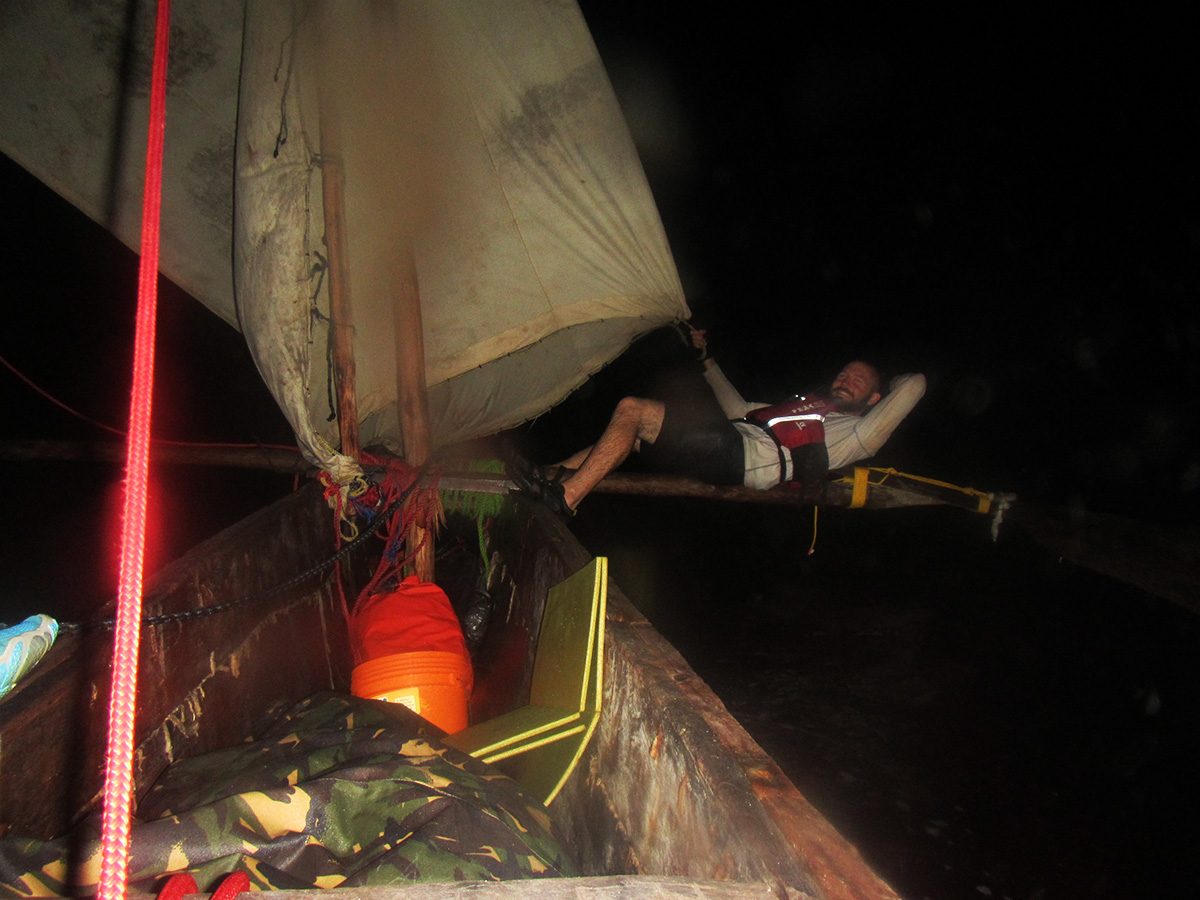
About half an hour later, Jonty looks up from the map with a smile on his face. “Right there, lads,” Jonty says, pointing at a spot in the distance. “That’s the finish line.”
The shore is close. According to the map, it’s less than two kilometers from our current location. But there’s a problem. To reach it, we have to fight our way back into the wind and against the tide. We have virtually no control over the angle of our sail and, if we maintain our current heading, we’ll soon find ourselves out to sea. There is only one option.
We lost one of the paddles in the reef, which is going to make this even more challenging than it would otherwise be. To make ground against the wind and tide, we’re going to have to paddle like never before. At our current rate, a single minute of rest will likely undo 5 minutes of paddling. 100 strokes each; that’s what we decide.
I start the first rotation. We drop the sail and tie it up as best we can. I grip the paddle firmly, close my eyes, and begin to paddle with all the fury that I can muster.
50 strokes. My muscles are on fire. I grit my teeth and keep going.
75 strokes. Julian is in position, ready to take over.
100 strokes. I pass the paddle and get out of the way.
I gasp for breath and watch as Julian strikes the water like a madman. I have 200 strokes to recover and then it is my turn again.
Jonty’s turn comes too soon, and he attacks the water with ferocity. We’re going to finish the race or die trying. At this point, I don’t know which outcome is more likely.
50 strokes. I’m not recovered.
75 strokes. I need more time!
It’s my turn, again.
Time becomes stuck in a hellish loop of pulling and gasping for breath. We track our progress periodically and find, to our relief, that we’re moving forward. Progress is painfully slow, but we’re moving forward.
30 minutes pass, then 60, then 90. We’re 100 meters from shore!
Exhausted, I grab a rope, grip it between my teeth, and execute a flawless belly flop into the ocean. My body is heavy. Were it not for my life vest, I’d sink like a stone. Still, I kick feebly, depleting the last of my energy on one final scramble towards land.
My feet touch sand, then my knees, then my hands. Slowly, the rope still firmly clasped between my teeth, I crawl onto the beach. I turn around and take a good look at the Ngalawa and crew that carried me hundreds of kilometers across the Indian Ocean. Then, I complete my final duty as a “Badger”; I pull my team to shore.
I collapse onto my back and close my eyes. My body is broken but, despite the exhaustion, I can’t wipe the smile off of my face. The fight is over.
My only regret is that Clinton isn’t here to finish with me.

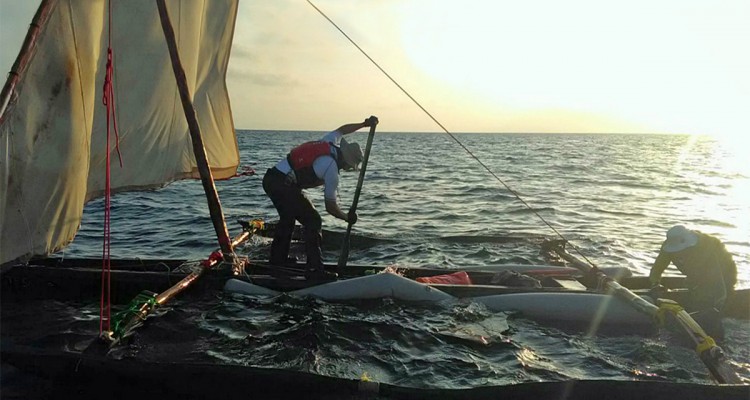
Leave a Reply